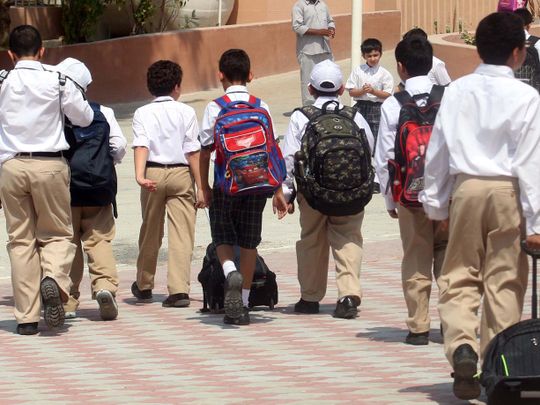
Abu Dhabi: Fees of private schools are linked to performance and quality of education offered, ministers responsible for education told the Federal National Council (FNC) on Tuesday.
The ministers were responding to requests from a FNC member to tighten controls on fees levied by private schools, which exceed tuition fees in many universities.
Hussain Al Hammadi |
Hussain Ebrahim Al Hammadi, Minister of Education, said regulators in Abu Dhabi and Dubai and the ministry control tuition fees and other charges.
Jameela Salem Al Muhairi, Minister of State for Public Education, said regulators take into account investment and satisfaction of clients, mainly parents and students, when it comes to fees.
Azza Sulaiman Bin Sulaiman, FNC member from Dubai, said parents are worried about paying ever-increasing and unjustified private school fees.
Bin Sulaiman demanded that the ministry set criteria to safeguard parents against exploitation by some unscrupulous businessmen running schools.
The member said parents have also complained about surcharges, including for transport, uniforms, extra-curricular activities and books.
Business
Bin Sulaiman argued that some private schools have become mere businesses seeking excessive profits.
“Some schools even force parents to buy uniforms from certain companies, or through the schools, not letting parents buy what meets their budgets,” the member said.
The ministers admitted that certain schools illegally increased fees, but said that such institutions were fined.
According to a report published by Dubai's Knowledge and Human Development Authority in 2015, more than 61 per cent of students in Dubai pay more than Dh10,000 per annum in school fees.
Starting September, private schools in Sharjah, Ajman, Ras Al Khaimah, Umm Al Quwain and Fujairah will be assessed and rated accordingly.
Federal law
Though federal law No 28 of 1999 allows private schools to raise their tuition fees once in three years, the reality is often different.
Schools in the UAE charge according to the curriculum they offer, with international ones coming on top of the fee pyramid and Asian ones being more affordable.
However, most parents, irrespective of the curriculum, maintain their children’s school fees are a major expense of their household budget.
According to a WhichSchoolAdvisor.com poll, expatriates spend about 30 per cent of their income on their children’s education.
New law to regulate early education
Jameela Salem Al Muhairi |
A new law concerning education of children (formally and informally) up to the age of six has been submitted to the Education and Human Resources Council, Jameela Salem Al Muhairi, Minister of State for Public Education, told the Federal National Council.
The new law is part of a strategy for motherhood and childhood approved by the Cabinet recently.
The strategy is a national framework for programmes and services available to mothers and children. A national taskforce will be set up to develop action plans and coordinate the implementation of the strategy and its initiatives.
Al Muhairi was responding to questions by Hamad Al Rahoumi, a member from Dubai, on increasing workplace creches.
Nursery
Al Rahoumi argued having an accessible nursery, and allocated periods during the work day in which they can see their child and engage in activities such as breastfeeding and play.
The member added that workplace nurseries will also have cognitive, psychological and socio-emotional benefits for early childhood development and help mothers to improve their work-life balance and increase productivity.
A Cabinet resolution stated that ministries and other government institutions with more than 50 female employees should set up creches.
Only 60 government departments out of 320 have done so, according to Dr Amal Al Qubaisi, FNC Speaker.













